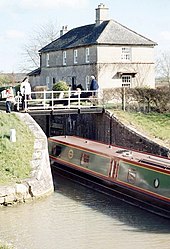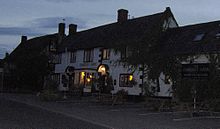Semington
| Semington | |
|---|---|
 Village hall | |
Location within Wiltshire | |
| Population | 930 (2011 census)[1] |
| OS grid reference | ST896604 |
| Civil parish |
|
| Unitary authority | |
| Ceremonial county | |
| Region | |
| Country | England |
| Sovereign state | United Kingdom |
| Post town | Trowbridge |
| Postcode district | BA14 |
| Dialling code | 01380 |
| Police | Wiltshire |
| Fire | Dorset and Wiltshire |
| Ambulance | South Western |
| UK Parliament | |
| Website | Parish Council |
Semington is a village and civil parish in Wiltshire, England. The village is about 2 miles (3 km) south of Melksham and about 3 miles (5 km) northeast of Trowbridge. The parish includes the hamlets of Little Marsh and Littleton.[2]
The village has two locks on the Kennet and Avon Canal, known as the Semington Locks, and nearby is the start of the disused Wilts and Berks Canal.
Geography
The Semington Brook, a westward-flowing tributary of the Avon,[3] forms the east and north boundaries of the parish. Sometime after 1818, the central part of the northern boundary was realigned to follow the Kennet and Avon Canal.[4]
Semington village developed along the main road from Melksham to Westbury which became the A350 primary route. In 2004 a bypass was opened, taking the A350 0.4 miles (0.64 km) east of the village.[5]
Little Marsh (or Littlemarsh) is a hamlet south of Semington, along the old course of the A350. Littleton is no longer populated, and the only area currently designated as belonging to Littleton is the roundabout at the A350 and A361 road crossing.
Governance
The civil parish elects a parish council. It is in the area of Wiltshire Council unitary authority, which is responsible for all significant local government functions.
History
Anciently, Semington and Littleton were each tithings of Steeple Ashton parish (Semington village being about 2+1⁄4 miles (4 km) north of Steeple Ashton village). In the late 19th century the civil parish of Semington was formed from the two tithings, and in 1894 the ancient parish of Whaddon was added to it.[4] Whaddon was transferred to Hilperton in the late 20th century.[6]
The population of the parish was in the range 400 to 500 for many years, from the 1841 census to that of 1931. Numbers then gradually increased to reach 930 in 2011.[1]
Canals

The Kennet and Avon Canal crosses marshy ground on an embankment on the northern edge of the village.
The two Semington locks were built between 1794 and 1802 under the supervision of the engineer John Rennie.[7] They have a combined rise/fall of 16 ft 1 in (4.9 m).[8] The two locks at Semington are known as Buckley's (numbered 15) and Barrett's (16).[9]
Next to the locks is the point at which the Wilts & Berks Canal left the Kennet and Avon. The Wilts & Berks is disused but the Wilts & Berks Canal Trust is restoring it. East of the locks, the canal travels across the 2004 Semington Aqueduct, built to allow the A350 to bypass Semington village. Another aqueduct carries the canal over Semington Brook.[10]
The canal, towpath and adjacent hedges are good for wildlife and in August 2007 water voles were seen.[11]
Former railway
The Devizes Branch Line was built 0.6 miles (0.97 km) north of the village in 1857. A small station (Semington Halt) was opened in 1906 where the railway crossed both the A350 and the Wilts & Berks canal; the station and the line were closed in 1966.
Former workhouse
Just west of the village is the former St George's Hospital, built in 1836–38 as a workhouse for the Melksham poor law union to designs of H. E. Kendall. The nine-bay north front in classical style has two storeys and a three-bay pediment; behind this, further ranges of one, two and three storeys surround four courtyards. The front is limestone ashlar and the rear ranges are dressed limestone.[12] Pevsner writes: "It is typical of the coming of the Victorian age how the classical and Grecian motifs get clumsy and extremely heavy".[13]
In 1988, when the building was recorded as Grade II listed, it was in use as a hospital for people with learning disabilities.[12] Today it is largely in residential use, while a charity providing advice to disabled people occupies the ground floor of one building.[14]
World War II
During the Second World War, Semington was on GHQ Line which followed the path of the canal. Semington was designated as a centre of resistance: extensive anti-tank ditches were constructed to the east, south, and west of the village, these were overlooked by a number of pillboxes. The defences were constructed as a part of British anti-invasion preparations.[15]
Parish church

The Church of England parish church of St George is a Grade II listed building.[16] It dates from the 15th century and was largely rebuilt in 1860.[17] Anciently a chapelry of Steeple Ashton, Semington was made an independent parish in 2000,[17] and today the parish is part of the Canalside Benefice alongside parishes in Hilperton and Whaddon.[18]
Amenities

Within the village there are over 500 houses, a primary school,[19] a village hall,[20] public tennis courts and a park for children. Semington has a pub, The Somerset Arms, an 18th-century building.[21]
National Cycle Route 4 follows the canal towpath, and at the road bridge just north of Semington village, route 403 branches north to Melksham and beyond.[22]
Economy
About 1 km north of the village, in Melksham Without parish, is Hampton Park West business park which has the corporate headquarters of companies such as G-Plan, Avon Rubber plc and a Wiltshire Police operations centre.

Notable residents
- Isaac Gulliver (1745–1822), smuggler[23]
- Thomas Helliker (1784–1803), trade union martyr, hanged for his alleged role in burning Littleton mill[24]
Sources
- Foot, William (2006). Beaches, fields, streets, and hills ... the anti-invasion landscapes of England, 1940. Council for British Archaeology. ISBN 1-902771-53-2.
- "Semington". Wiltshire Community History. Wiltshire Council. Retrieved 18 April 2015.
References
- ^ a b "Semington census information". Wiltshire Community History. Wiltshire Council. Retrieved 14 January 2020.
- ^ election-maps.co.uk, Semington Civil Parish boundary on Ordnance Survey 1:50,000 colour raster layer. Retrieved 23 October 2006.
- ^ "Semington Brook, lower part". Catchment Data Explorer. Environment Agency. Retrieved 17 January 2020.
- ^ a b "Victoria County History: Wiltshire: Vol 8 pp198–218 – Steeple Ashton". British History Online. University of London. 1965. Retrieved 17 January 2020.
- ^ "Bypass set to open to fanfare of celebrations". Brighton. 26 March 2004. Retrieved 18 April 2015.
- ^ "Hilperton". Wiltshire Community History. Wiltshire Council. Retrieved 14 January 2020.
- ^ "Reed Hotel Boats".
- ^ Pearson, Michael (2003). Kennet & Avon Middle Thames:Pearson's Canal Companion. Rugby: Central Waterways Supplies. ISBN 0-907864-97-X.
- ^ Allsop, Niall (1987). The Kennet & Avon Canal. Bath: Millstream Book. ISBN 0-948975-15-6.
- ^ Historic England. "Semington Aqueduct (1252241)". National Heritage List for England. Retrieved 25 October 2006.
- ^ "Watervoles". UK Biodiversity Action Plan. Archived from the original on 26 February 2007. Retrieved 17 March 2007.
- ^ a b Historic England. "St George's Hospital (1262030)". National Heritage List for England. Retrieved 16 January 2020.
- ^ Pevsner, Nikolaus; Cherry, Bridget (revision) (1975) [1963]. Wiltshire. The Buildings of England (2nd ed.). Harmondsworth: Penguin Books. p. 466. ISBN 0-14-0710-26-4.
- ^ "Independent Living Centre". Retrieved 16 January 2020.
- ^ Foot, 2006, pp. 291–296.
- ^ Historic England. "Church of St. George (1262412)". National Heritage List for England. Retrieved 25 October 2006.
- ^ a b "Church of St. George, Semington". Wiltshire Community History. Wiltshire Council. Retrieved 18 April 2015.
- ^ "The Canalside Benefice - Semington". canalsidebenefice.org.uk. Retrieved 11 January 2020.
- ^ "St George's Church of England Primary School, Semington". Retrieved 18 April 2015.
- ^ "Semington Village Hall". The Charity Commission. Retrieved 18 April 2015.
- ^ Historic England. "The Somerset Arms (1262379)". National Heritage List for England. Retrieved 17 January 2020.
- ^ "Route 403". Sustrans. Retrieved 17 January 2020.
- ^ "The King of the Smugglers". The Dorset Page. Archived from the original on 10 July 2016.
- ^ "Mechanisation & Thomas Hiliker - Trowbridge Museum". Retrieved 18 December 2020.

